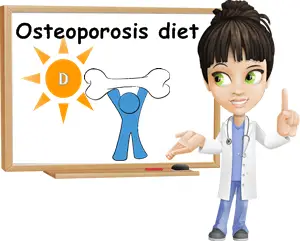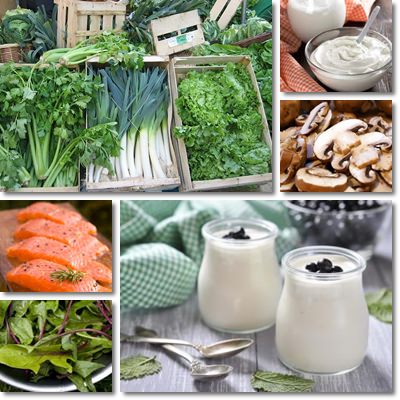The last thing to cross our minds when we envision ourselves growing old is probably osteoporosis. We all think we eat right, get enough nutrients from food and keep sufficiently active to not even have to entertain the thought that we might be at risk for thin, frail bones predisposed to debilitating fractures at a later point in our lives.
But despite the awareness surrounding this condition, we are not actually being given factual information on how to actively prevent bone thinning and reduce our risk of osteoporosis later on in life.
One of the two key factors in preventing the onset of osteoporosis, along with physical exercise, is proper nutrition. Eating right is vital for strong, healthy bones.
A diet focused on the prevention of osteoporosis, but also applicable to osteoporosis treatment should begin early on and focus on several essential nutrients for bone health: calcium, magnesium and phosphorus and vitamins D and C.

The above-listed nutrients are found in higher amounts in particular foods which we should include in our diet as often as possible to ensure we give our bones everything they need to be strong and healthy.
At the same time, we should keep in mind that including certain foods in our diet does not mean excluding other nutritious options. It only means we should make sure we get generous amounts of bone-friendly nutrients and foods as well. The nutrients required for healthy bones and osteoporosis prevention work together to maintain bone integrity, strength and flexibility, all important characteristics that contribute to a strong bone frame.
Vitamins and minerals for strong bones
1) Calcium and phosphorus
Calcium and phosphorus are two of the most important nutrients to consider when it comes to bone health and osteoporosis prevention. This is because the minerals are important physical components of our bones, required for maintaining bone integrity and strength.
When faced with a calcium deficiency, for example, our body will start taking calcium from our bones to supply other vital organs and tissues with this essential mineral. If we do not up our intake of the mineral, we risk weak bones and, eventually, osteoporosis.
2) Vitamin D
Which we get both from food sources and sun exposure, is what helps our body absorb calcium and phosphorus. Without it, our body wouldn’t absorb much of the calcium we ingest and we would be left with frail, breakable bones.
Low vitamin D levels have been linked to higher risks for osteoporosis and bone fractures, not to mention certain cancers. As far as bone health is concerned, a vitamin D deficit means our intestines absorb too little calcium.
When blood calcium levels drops (because we have calcium in our blood as well), our body depletes our bones of calcium, a sort of an emergency mechanism which, in time, can lead to thin, frail bones and even osteoporosis. While eating foods rich in vitamin D such as egg yolks or fish is important for bone and overall health, getting enough sun activates natural mechanisms that allow our body to produce its own vitamin D, a form far superior to the synthetic vitamin.

3) Magnesium
Magnesium not only promotes the absorption of calcium in bones and teeth, but also participates in a number of hormonal processes that help maintain bone health.
For example, the mineral is responsible for converting vitamin D into an active form our body makes better use of. At the same time, magnesium ensures the calcium we absorb goes into our bones instead of getting lost elsewhere.
Having a high calcium intake but a magnesium deficiency or a low magnesium intake can lead to calcium depositing in other areas such as joints, heart valves or even kidneys, increasing the risk for arthritis, atherosclerosis or kidney stones.
Because all nutrients work together when it comes to keeping us healthy, having osteopenia or osteoporosis most likely means you have a magnesium deficit as well. Of course, if you are considering supplementing with magnesium, know there are many options available. See my article on magnesium forms and which to choose.
4) Vitamin C
You may be wondering what vitamin C has to do with bone health. About 30% of our body is made up of collagen, a protein responsible for maintaining structure. Collagen is an important component of our bones as well. Vitamin C stimulates collagen production, hence its role in bone health and osteoporosis prevention.
At the same time, vitamin C has been shown to help regulate the production of both progesterone and estrogen, the two major female hormones.
Osteoporosis in women is most likely to occur following reproductive age when estrogen levels drop significantly, promoting bones loss and increasing the risk of fractures. By helping combat hormonal imbalances, vitamin C may contribute to stronger, healthier bones and minimize bone fracture risks.
But as more recent research reveals, our body needs surprisingly high amounts of vitamin C on a daily basis to merely not go into deficit (from 1,000 mg or 1 g upwards). This means that we have to rely on dietary supplements to ensure our body gets the amounts it needs to keep us healthy.
Best foods to eat For Avoiding for Osteoporosis
So where do we get our vitamins and minerals from? Here are some of the most reliable and easily available food sources that supply all the basic nutrients for strong, healthy bones:
1) Sun exposure and dietary supplements for vitamin D. Whenever possible, we should try to get some sun to help set in motion our body’s natural vitamin D production mechanisms. But since this is not always possible (during winter, for example), eating right and relying on a quality brand of vitamin D supplements will ensure we supply our body with all the vitamin D it requires for keeping our bones healthy.
2) Vitamin D-rich foods. Salmon, mackerel, mushrooms, tuna, sardines and egg yolks are the best food sources of vitamin D. Including them in your diet as often as possible to help up your intake is important because vitamin D is found in very few foods naturally.
3) Calcium rich foods. Milk and dairy products such as yogurt and cheeses, sardines and many green leafy vegetables such as spinach, kale, collard greens, Bok choy, turnip greens, broccoli, chard, mustard greens, beet greens and oranges are great options.
4) Phosphorus food sources. Pumpkin seeds, sunflower seeds, sesame seeds, squash seeds, salmon and other fish and seafood (tuna, mackerel, carp, cod, oysters, clams, crabs, scallops, shrimp, mussels) Brazil nuts, almonds and pistachios as well as beans, peas, chickpeas and lentils are great options.
5) Magnesium-rich foods. Dark chocolate and cocoa, pumpkin seeds, almonds, sunflower seeds, cashews, pine nuts, green leafy vegetables (chard, spinach, collard greens), beans, chickpeas, lentils, dried fruits, bananas, whole grains such as quinoa, buckwheat, barley and fish (salmon, halibut, mackerel) are all wonderful options for increasing your phosphorus intake naturally.
Worst foods to eat For Osteoporosis
When it comes to eating right, any food that isn’t bringing any contribution to our health is bad for us. This includes all packaged, semi-cooked or other similar modern culinary wonders with a low or inexistent nutritional profile.
If it doesn’t list some vitamins or dietary minerals on the label or contains more than three artificial preservatives, then we probably shouldn’t be eating it.
Some foods and beverages are worse than others, particularly those which promote nutritional deficiencies. Soda or fizzy drinks, alcoholic beverages, caffeinated drinks and even excess coffee and numerous medications can reduce the amounts of nutrients our body absorbs and, in time, engender severe deficiencies that may go unnoticed until unfortunate events such as bone weakening and fractures occur.
Including as many healthy food sources as possible in our daily diet is sure to supply our body with essential nutrients for bone health and offer excellent protection against osteoporosis and bone fractures.
But just as important as starting to eat right is continuing to do so because our bones need support and the right nutrients every single day to stay strong and healthy.
